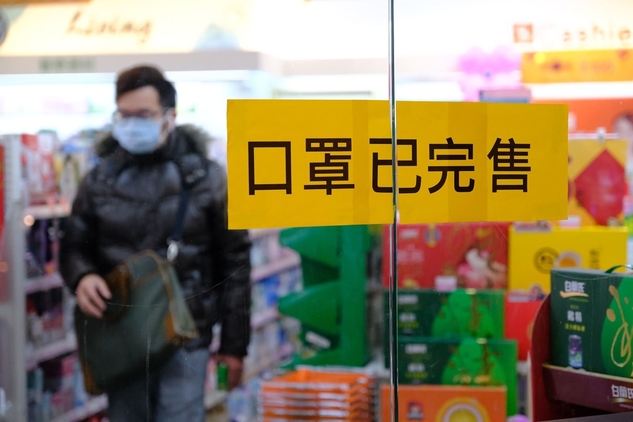Guest-Writer
Migrant Workers Struggle to Secure Masks in Taiwan amid COVID-19 Fear

Source:Kuo-Tai Liu
Since the outbreak of COVID-19 in Taiwan, the government has launched several waves of public awareness campaigns. One of the consistent messages concerning face masks is that it is unnecessary for healthy individuals to wear a face mask at all times. However, it is advised to wear one when going to hospitals, visiting public places and taking public transport. For those who are already ill, they are particularly advised to wear a face mask. What I would like to point out in the following is grounded on this understanding. Nonetheless, as a labour activist who works closely with, and for, migrant workers, I would like to raise public attention to some critical issues faced by migrant workers which may not be known to the general public.
Views
Migrant Workers Struggle to Secure Masks in Taiwan amid COVID-19 Fear
By Ying-da Wongweb only
Written by Ying-da Wong, Director of Service Center and Shelter for Migrant Workers, Serve the People Association (SPA), Taoyuan
Controlling the Distribution of Face Masks by NHI Identification Number
According to the National Health Insurance Act, foreign nationals who legally reside in Taiwan for more than six months are entitled to the National Health Insurance (NHI). For those whose residency is less than six months, they cannot be included in the NHI unless they are in a legal employment. On 3rd February 2020, the government announced a suite of measures controlling the sale of face masks. Under this policy, masks are sold only by pharmacies that are chartered by the National Health Insurance Administration (NHIA). All citizens and foreign residents may purchase only two face masks in one week, and they must present their National Health Insurance Certificate (the NHI Card) that has an IC chip allowing access to their personal data. Those whose NHI identification number ends on an odd number may purchase on Monday, Wednesday and Friday; those whose number ends on an even number could purchase on Tuesday, Thursday and Saturday. There is no restriction on eligibility placed on Sunday. On 4th February, this controlling measure was modified that foreign residents can purchase by presenting their Alien Resident Certificate (ARC) or passports and their purchase is subject to the same number system.
I trust that this controlling system is a result of the government’s careful assessment. Nevertheless, the government seemed to assume that all citizens and foreign residents have an NHI Card and that their NHI Card is valid. As a matter of fact, as detailed below, there is a wide gap between this presumption and reality. This gap may affect people’s rights or adversely curtail the effectiveness of disease prevention. So before I move on, a fundamental question has to be asked: are migrant workers entitled to the NHI and are they issued with an NHI Card?
A cautious answer is yes. Those who are recruited under the Employment Services Act are covered by the NHI via by their employers. This refers to domestic caregivers, caregivers at nursing homes, factory workers, construction workers, butchery workers, a fractional number of agricultural workers (legalised in January 2019), and fishermen from Indonesia, Vietnam, the Philippines and Thailand who work on inshore fishing vessels. However, this excludes foreign fishermen recruited abroad and work on offshore fishing vessels. Even if they work on an ROC-flag fishing vessel, they are not entitled to statutory labour rights. Thus, they are not covered by labour insurance or the NHI. They are only protected by private insurance purchased by their employers.
Against this cautious answer, I would like to point out potential issues and challenges that may not be factored into the government’s controlling measures.
Foreign Fishermen Ineligible for The NHI
First of all, as mentioned above, fishermen recruited abroad on offshore fishing vessels cannot purchase face masks given their ineligibility for NHI. This affects more than 20,000 foreign fishermen. It may be argued that they may not stay in Taiwan for long and thus they may not need face masks in a great number. Nevertheless, the government’s policy should not be made with the implication that it may exclude a specific group and make them vulnerable to health risks. A potential scenario will be that a foreign fisherman is hospitalised and, since he does not have the right to family reunion, he may be cared by other fishermen from the same vessel or from a different vessel. If neither their employers nor the medical staff at the hospital provide face masks, they will be exposed to risks and their exposure will increase the difficulty to contain the disease. (Read also: Reaching out to Undocumented Workers is Necessary to Contain COVID-19 Outbreak)
NHI Cards Confiscated by Employers
Secondly, some migrant workers’ NHI Cards are confiscated by their employers so they are not able to purchase face masks. It is widely known that in Taiwan some migrant workers are forced to leave personal documentations to the care of their employers. These may include their passports, ARCs, NHI Cards and employment contracts. Most often their employers confiscate their passports, leaving the ARC and NHI Card with them. There is no official figure to ascertain how many migrant workers do not have their NHI Cards in their own possession. Anecdotal evidence suggests that there are such cases, although not in a considerable number. Therefore, although any of these identification documents can be used for purchasing face masks, some migrant workers may not be able to present any of them. On the other hand, it is also reported that some pharmacies refused to sell to individuals who did not present NHI Cards. This may be because pharmacies have to type their passport or ARC numbers into the system in order to check their purchasing record, whereas an NHI Card can be read by a card reader for the cardholder’s purchasing records. Manually typing identification numbers takes time and slows down their service.
Home-based Caregivers Less Free to Purchase but in A Higher Need
Thirdly, most home-based caregivers are restricted by their employers and cannot freely leave their employers’ home (i.e. their workplace). They cannot have a day off regularly. Thus, it is difficult for them to purchase their face masks. Their lack of freedom may be part of their job description since they are employed for providing around-the-clock care for a family member. On the other hand, their restricted mobility may also be a result of their employers’ control. If they cannot leave their workplace freely, how could they purchase face masks?
Fourthly, even if migrant workers (particularly home-based caregivers) are free to leave their workplace and purchase their face masks at a nearby pharmacy, they may not be able to remain in the long queue, since most employers are less tolerant for their absence from work.
Fifthly, many caregivers and their patients have a demand for face masks more than the allocated number (two in one week). Many caregivers frequently, if not regularly, escort their patients to go to hospital or clinics for rehabilitation or dialysis; in some cases, rehabilitation therapy requires daily visit to the health institution. Given that there is a higher risk for infection at hospitals or health institutions, it is advisable to wear face masks. Therefore, two face masks in a week may not meet the need of caregivers and the people they look after.
Migrant Workers’ Irregular Time Off
Sixthly, migrant workers may not be able to abide by the policy of purchasing on the allocated weekdays. Many factories run shifts, and migrant workers’ weekends and day off may be adjusted accordingly. Employers often put migrant workers on overtime. Therefore, migrant workers may not be able to purchase on the allocated weekdays. It is true that they will have time off. However, their time off is also subject to their employers’ approval. This restriction further limits the time available to them to purchase face masks outside of their workplace. As mentioned above, fishermen working on inshore fishing vessels are entitled to the NHI. However, their work time is mostly determined by the weather so their time off is unpredictable. When they are not working due to bad weather, their employers may assign them to other tasks. So they are further constrained and may not be able to go to a pharmacy on the allocated weekdays.
Migrant Workers in Transition Not Covered by The NHI
Last but not least, a critical challenge arises amongst those who are in transition between two employers but who have not legally resided in Taiwan for more than six months. My shelter has assisted such a fisherman who fell seriously ill during transition. We accommodated him in our shelter after his plea for help to his broker was refused, but our application to the NHIA was stonewalled. The NHIA maintained that he was ineligible because he had not resided in Taiwan for more than six months. We as a sheltering institution could not apply for him since he was not employed. On the other hand, we also encountered those migrant workers who, in spite of being out of job, were eligible since they had legally resided in Taiwan for more than six months. Nevertheless, reluctant to pay the monthly NHI premium, they chose not to be covered, even though my shelter could apply on their behalf. In short, migrant workers in between jobs may not be covered by the NHI, which renders their NHI Card invalid. With an invalid NHI Card, they will have to present their passports or ARCs for purchasing face masks.
To conclude, I understand that the supply of face masks as controlled by the government cannot meet everyone’s demand. I also appreciate that the controlling measures adopted by the government serve a critical purpose. To the issues raised above, I am aware that employers, hospitals, sheltering institutions or recruitment agencies have the care responsibility to provide face masks for migrant workers. It can also be argued that what I detailed above are ‘extreme’ cases where the number of needed face masks is small.
Nevertheless, my point is that more than 710,000 migrant workers who reside and work in Taiwan should have the right to purchase face masks for their health; protecting them also contributes to public interest. Because multilingual information provided by the government is scarce, migrant workers have managed to grasp information about COVID-19 as much as they could. The government should make efforts to reach out to those affected in these scenarios laid out above in order to effectively curtail the spread of the disease.
Have you read?
♦ Civic Tech Versus COVID-19: Online Map and Reservation System Help Fight the Virus
♦ Where is Globalization Headed Amid COVID-19 Epidemic?
♦ How Taiwan Fights COVID-19
♦ Desperation in Wuhan
♦ Apple Supply Chain Disrupted by Novel Coronavirus
♦ Coronavirus to Take Bite out of GDP - Can Taiwanese Companies Cope?
Original content can be found at the website of United Daily News opinion. Translated and edited by Isabelle Cheng, Senior Lecturer in East Asian and International Development Studies, University of Portsmouth












